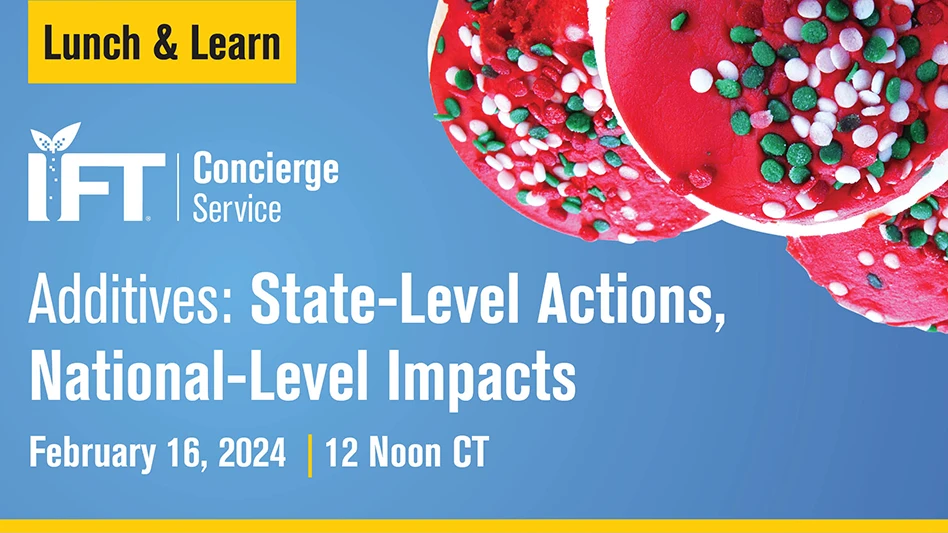
Photo courtesy IFT
CHICAGO — The Institute of Food Technologists (IFT), a nonprofit scientific organization with global members spanning academia, government and industry, is hosting a webinar on “Additives: State-Level Actions, National-Level Impacts” on Friday, Feb. 16, from 12-1 p.m. CDT.
The webinar will address the complex and confusing environment food scientists are currently facing as stakeholders increasingly focus on food additives safety. Specifically, the webinar will focus on the recently passed California Food Safety Act and related legislation in Illinois (SB2637) and New York (S6055) banning brominated vegetable oil, potassium bromate, propylparaben and red dye No. 3. Illinois is also expected to pursue banning titanium dioxide as part of the Illinois Food Safety Act.
Recently, IFT weighed in on the potential impact of the proposed Illinois Food Safety Act in public comments that can be found here.
“In a complex world where consumer groups, state-level legislations and the FDA all seek to identify, review and prioritize food additive safety, it is essential for food scientists to understand the concerns, science and implications of the resulting actions,” said IFT Chief Science and Technology Officer Bryan Hitchcock. “This webinar will help attendees gain clarity on what they should be thinking about related to these proposed and active bills, which could have far-reaching impacts that will create a variety of challenges.”
Food toxicology experts Craig Llewellyn, Ph.D., and James R. Coughlin, Ph.D., will offer their perspectives on the history and widespread implications of the state-level actions on food products, supply chains and businesses, as well as the significant challenges and opportunities for U.S. food scientists related to the state-level legislation.
Llewellyn has more than 25 years of experience in toxicology, analytical food chemistry, scientific and regulatory affairs, designing and conducting scientific research and product development from positions in academia; food, pharmaceutical and coatings corporations; and state government. He provides scientific and regulatory evaluations and support in various areas including direct and indirect food additives, flavorings, food allergens, ingredients and precursors used by food and beverage, cosmetic ingredients, dietary supplements, consumer products, specialty chemicals and pharmaceutical industries. He did his post-doctoral training with Eli Lilly and Co. and has held positions with ingredient and product safety as well as global scientific and regulatory affairs responsibilities for SafeBridge Regulatory and Life Sciences Group, Kraft Foods, The William Wrigley Jr. Company and The Coca-Cola Company.
Coughlin is an IFT Fellow and was recognized with IFT’s Bernhard L. Oser Food Ingredient Safety Award in 2020. He did his post-doctoral training at the University of California – Davis and spent two years at Armour Foods followed by 10 years at General Foods and Kraft General Foods in external scientific affairs before undertaking independent food toxicology consulting in Southern California in 1992. Coughlin has served numerous times as Chair of IFT’s Toxicology and Safety Evaluation Division and for 17 years as IFT’s Codex Subject Expert on Contaminants in Food. He specializes in global food safety and benefit-risk evaluations, risk assessment and risk communication of food additives and contaminants and health and regulatory issues surrounding coffee/caffeine, nitrate/nitrite/nitric oxide, red/processed meats, GRAS ingredients, confectionary products, dietary supplements, California Proposition 65 and other major food/functional food/dietary supplement products and ingredients.
To register for the webinar, visit https://info.ift.org/additives-lunch-and-learn.
The webinar is presented by IFT’s Concierge Service, which helps companies address the implications of the California Food Safety Act and similar bills, provides regulatory assistance with new and imported products, supports conquering product development hurdles, identifies and consolidates existing research and assists with other time-sensitive tasks. IFT’s Concierge Service provides teams on-demand access to trained food scientists and other experts. To learn more, visit www.ift.org/concierge-service.
Latest from Quality Assurance & Food Safety
- Chef Robotics Introduces Pat-Down Capability for Meal Presentation and Sealing
- USDA Launches Regenerative Pilot Program
- Indoor Ag-Con Adds Food Safety Track to Conference Lineup
- IDFA Recognizes Federal Officials for Support of U.S. Dairy Industry
- Tetra Pak Acquires Bioreactors.net
- Fresh Del Monte Receives Rabobank Leadership Award
- São Paulo Earns Guinness World Record for Largest Municipal Food Security Program
- KPM Analytics Releases Ready-to-Use NIR Calibration Packages





